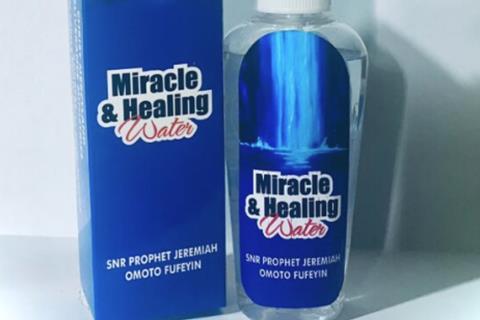A Nigerian church has come under fire for selling ‘miracle products’ supposedly imbued with healing properties. The Bible does talk about holy water, anointing the sick with oil and even inanimate objects healing people – but God’s power shouldn’t come with a price tag, warns Kate Orson

The Nigerian drug approval agency (NAFDAC) has warned people not to buy ‘miracle products’ such as holy water - and even holy soap! - being offered by Christ Mercyland Deliverance ministry.
The church, run by popular televangelist Jeremiah Omoto Fufeyin, offers products that claim to have healing properties and can even cure infertility. But NAFDAC said the claims were “bogus” and the products did not have their approval.
In response, a BBC article quoted the church as saying it is “law-abiding” and has been using “spiritual items in expression of [their] spiritual beliefs”.
Whether the products are actually illegal remains to be seen, but Mercyland are far from the only place that believers can purchase water supposedly from the river Jordan or pre-blessed holy oil. The Lourdes online gift shop sells holy water, soaps and oils blessed at the famous pilgrimage site, as do many other outlets from many other denominations.
Fufeyin is worth an estimated $35 million, so it appears that his ‘miracle’ products are benefitting his bank balance. But are they actually healing people? And should Christians buy them?
What does the Bible say?
Holy water makes an appearance in the Old Testament in Numbers 5:17. There are also incidences when objects appear to possess healing powers. In Acts 19:11-12 it says that “God did extraordinary miracles through Paul, so that even handkerchiefs and aprons that had touched him were taken to the sick, and their illnesses were cured and the evil spirits left them.” Acts 5:15 describes how “people brought the sick into the streets and laid them on beds and mats so that at least Peter’s shadow might fall on some of them as he passed by.”
Such negative publicity could encourage a belief that God does not heal today
The disciples were also instructed by Jesus to anoint people with oil when they healed them. In James 5:14-15, believers are told that if anyone is sick they should “call the elders of the church to pray over them and anoint them with oil in the name of the Lord. And the prayer offered in faith will make the sick person well; the Lord will raise them up. If they have sinned, they will be forgiven.”
Modern day miracles
I certainly believe that God still heals today, and that we shouldn’t put a limit on what he can do via those he anoints with the gift of healing.
However, in the Bible, no act of healing or deliverance ever comes with a price tag.
In Acts 8, a new convert named Simon tried to offer the apostles money in return for the gift of healing. Peter rebuked him, saying, “May your money perish with you, because you thought you could buy the gift of God with money! You have no part or share in this ministry, because your heart is not right before God.” (v18-21)
God loves a cheerful giver; one who donates freely to their church, but this generosity should never be in exchange for a particular product or promise.
No act of healing or deliverance ever comes with a price tag
When we anoint someone with oil, this is just one part of a process, together with the prayers of faithful believers and the forgiveness of sins. It’s interesting that the elders themselves are instructed to go in person and pray for the ill person. The oil is not treated as an idol that can be divorced from the community of believers and sent via mail order.
A better story
The sad thing about such negative publicity is that it could encourage a belief that God does not heal today, and that claims of miracles are deceptive. As Christians, we know that this is not true.
So how can we respond to such stories? I think we can use it as an opportunity to share the genuine miracles that God has done in our lives - and remind people that the promise of healing should never come with a financial demand.







































No comments yet